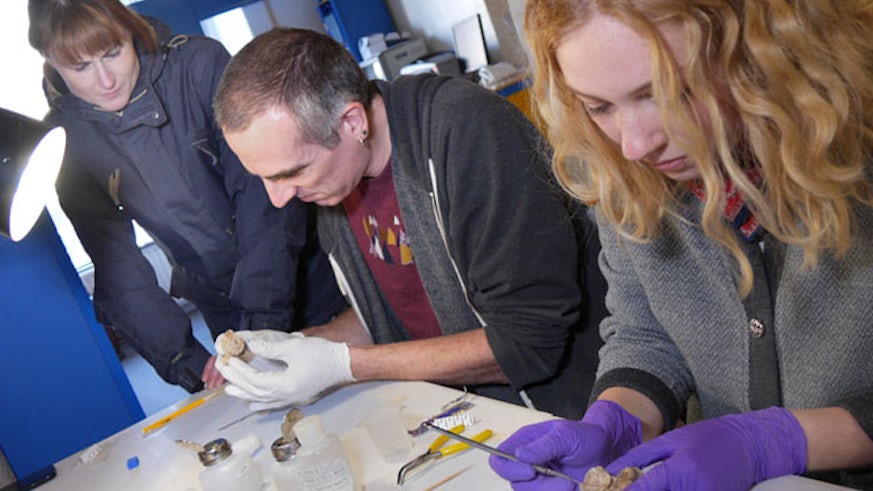Flower of the Stone Age flourishes again
29 January 2016

Llandudno’s oldest resident is conserved to showcase North Wales’ Stone Age past.
Conservators from Cardiff University have conserved a Stone Age skeleton thanks to a Llandudno Museum project funded by the Association of Independent Museums’ Conservation Grant Scheme.
Known locally as Blodwen, the 5,500 year old skeleton was originally recovered at the end of the 19th century from a fissure on the Little Orme overlooking Llandudno during quarrying. With no museum in the town at the time, she was taken by quarry owner Joseph Storey back to his home town of Bacup in Lancashire.
Following a long term campaign by local historian the late Ken Dibble, and with the support of Llandudno Museum, the skeleton was finally returned to the North Wales town last year after residence in England for 123 years.
Senior Conservator Phil Parkes and Johanna Thunberg, a MSc in Professional Conservation student at Cardiff, spent three days working on the project on site at the museum where Blodwen, ‘little white flower’ in Welsh, will remain on permanent display for the benefit of local people.
Project lead Phil Parkes explained the amount of work involved: “Overall the skeleton was in a stable condition, but upon closer examination it was noted that areas where the spongy bone was exposed were generally weak. We removed the old adhesive where it was visible and re-joined broken bones using an acrylic resin. The skeleton now looks more complete, with previously fragile areas in a more stable condition and old adhesive repairs no longer evident.”
Llandudno Museum Chair Roy Haley said: “We are very grateful for the support of the Association of Independent Museums for this important work to conserve the remains of Llandudno’s oldest inhabitant so that future generations can learn about this area 5,500 years ago, and share in Blodwen’s remarkable story.”
Cardiff University is highly regarded for the quality of its conservation degrees at undergraduate and postgraduate level. All students work on artefacts from museums, private collections and exhibitions as part of their training, most progressing to conservation work with institutions across the UK and internationally.